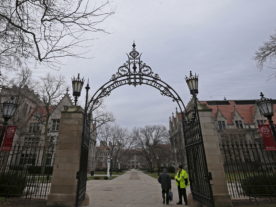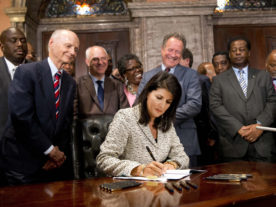Immigration remains a hot button issue in American politics as the November midterm elections approach, and surveys of likely midterm voters suggests a large majority of Americans support limits on legal immigration.
According to an April survey(PDF) from the Polling Company, a conservative research firm, nearly two-thirds of Americans support reducing legal immigration.
The Washington-based company asked likely voters, “Current federal policy adds about one million new immigrants with lifetime work permits into the U.S. each year. Knowing this, which is closest to the number of new immigrants the government should be adding each year?”
Sixty-four percent said “the federal government should be adding less immigrants with lifetime work permits.” This sentiment was shared among men, women, Republicans, Independents, Democrats and Hispanic/Latino voters.
Those surveyed were asked to choose between six levels of immigration, more than two million, 1.5 million, one million (the current level), 750,000, 500,000 or 250,000 or fewer. Almost half (49 percent) the respondents chose 250,000 or less, 11 percent chose 500,000 and four percent said 750,000. Seventeen percent agree with the current level of one million per year.
The Polling Company findings are similar to a January Harvard/Harris poll(PPT) on Americans’ attitudes toward immigration.
Harvard/Harris found 81 percent of those surveyed favored less immigration than the current rate. It found nine percent want no immigration, 35 percent want less than 250,000 immigrants, 19 percent wanted between 250,000 and 499,999 and 18 percent wanted 500,000 to 999,999.
The Polling Company found about 60 percent support a path to citizenship for so-called Dreamers if their relatives are not given priority to enter the country.
Harvard/Harris found 77 percent of Americans said Dreamers should be given a path to citizenship, but 60 percent also do not want their family members to be given immigration priority.
Dreamers, who were brought to the United States illegally as children, have been allowed to remain, but have not been given legal residence. Under U.S. law a citizen or legal permanent resident can sponsor relatives from their home country to move to the United States.
The ability to bring one’s family is called “chain migration” by opponents and “family-based immigration” by proponents.
Almost 60 percent (59 percent) of both poll’s respondents said immigrants should only be able to bring in their spouse and minor children. Currently, parents, siblings and some non-nuclear family members can immigrate.
U.S. President Donald Trump has been outspoken in wanting to reform the immigration system. He has charged Congress with devising a solution to the Dreamer issue.
“Under the current broken system, a single immigrant can bring in virtually unlimited numbers of distant relatives,” Trump said during his January State of the Union speech. “Under our plan, we focus on the immediate family by limiting sponsorships to spouses and minor children.”
In response, House Minority Leader Nancy Pelosi said Trump’s rhetoric on immigration “brings tears to the eyes of the Statue of Liberty.”

























Thank you for a balanced report on immigration. It seems VOA was biased in favor of illegals.
I waited years to become American–legally. It was worth it.
We legal immigrants are the most in favor of controlled immigration.
Finally something on VOA that reflects how Americans really feel.
Immigration is great.
Uncontrolled immigration is terrible.
VOA seems to not distinguish between legal and illegal. Shame.
We need to reduce legal immigration by 90% and have zero tolerance for illegal immigration.
we need to closed the immigration law all together of a period of 59.yrs before re opening the law
We need to end all immigration. The USA has a 20 trillion dollar debt, a crumbling infrastructure, and a massive homeless problem. All immigration should end.
How about feeding our own poor, housing our own homeless and raising the living-check-to-check wages of those BORN into “the American Dream”, rather than bringing in foreigners only too happy to work for less? Rather than liberals taking down statues of Confederate heroes, they should try taking down the Statue of Liberty, which has plainly outlived its purpose.
If you here illegally you should be deported. Close our borders for the time being. And enforce the laws we have on the book now. And start E-Verifying
Democrats are so hypocritical! They act like they care about the welfare of illegal immigrants . . . . all Democrats care about is the vote of illegal immigrants! American workers should come first . . . . instead . . . . many can’t get a job because some greedy employer would rather hire an illegal immigrant at reduced wages. All illegal immigrants should be deported whether they’re 1 day old or 100 years old and legal immigration needs to be limited as well. In order for America to help others, Americans must come first.
Demography is destiny. The immigration legislation of 1965 is poison to the American soul. The immigration legislation of 1985 is a stake into the heart of the Republic.
If we are to have a future America that resembles the past America, then future Americans must resemble past Americans, and for this political correctness must go. And recent imports who subscribe to the Civilization of Endless Antagonism Through Jihad have to go with it.
And the best time is as soon as possible.